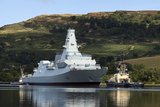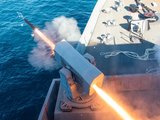Brazilian Navy prepares Riachuelo submarine for launch
The first of a new class of conventional submarines for the Brazilian Navy will be launched on 14 December, according to the Brazilian MoD, which released a statement confirming the transfer of the Riachuelo to a shiplift within the Itaguaí naval base.
The launch of Riachuelo is considered a milestone in the Submarine Development Programme known as PROSUB, intended to produce four conventional and one nuclear powered submarines.
Earlier this year, the Brazilian Navy held a ceremony to mark the three sections of Riachuelo, being fitted together.
The 71m diesel electric is the first of four submarines to be
Already have an account? Log in
Want to keep reading this article?
More from Naval Warfare
-
![Could Asia and the Middle East offer growth opportunities for Italy’s Fincantieri?]()
Could Asia and the Middle East offer growth opportunities for Italy’s Fincantieri?
Export campaigns for Fincantieri’s submarines and frigates are central to the company’s ambitions as billions of dollars in unawarded contracts come into focus.
-
![US Navy to develop an undersea networking capability to support UUV operations]()
US Navy to develop an undersea networking capability to support UUV operations
The NEREUS project aims to enhance and expand the US Navy’s existing communications systems, enabling crewed/uncrewed seabed and subsurface missions.
-
![How the Hedge Strategy will impact the US Navy’s future capabilities]()
How the Hedge Strategy will impact the US Navy’s future capabilities
The US Navy Hedge Strategy is intended to provide a lethal, modular and cost-effective fleet while accepting Washington’s fiscal and industrial constraints.
-
![US Navy and Raytheon explore additional applications for Mk 58 CRAW torpedo]()
US Navy and Raytheon explore additional applications for Mk 58 CRAW torpedo
Designed as an anti-torpedo and anti-submarine capability, the USN and RTX foresee the Compact Rapid Attack Weapon’s potential for deployment from surface ships and aerial and uncrewed platforms.






















